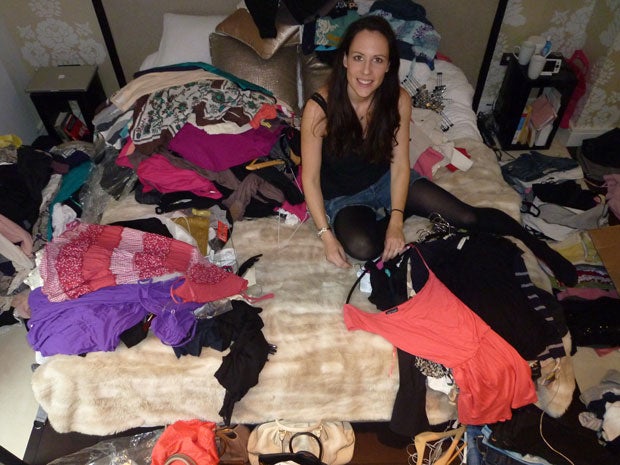Behind the chaos: Vicky Silverthorn talks de-cluttering
The professional organiser and de-clutterer of Lily Allen, La Roux, Ed Sheeran and members of the England rugby team talks to Emily Jenkinson about how to keep order at home

In recent weeks a number of television programmes, including Channel 4’s The Hoarder Next Door and BBC’s Britain’s Biggest Hoarders, have aired, highlighting the more serious end of a problem that is said to affect up to 57 per cent of the British population: clutter.
In recent years, a burgeoning anti-clutter industry and a raft of books on this topic have attempted to address this issue, but, for many, it is a losing battle.
But at what point does simple untidiness become clutter? Why is it so debilitating? And what can be done to prevent it? I caught up with professional de-clutterer and home organiser of the stars, Vicky Silverthorn, to find out more.
A house becomes cluttered when items get in the way of life running smoothly. When you start thinking things like 'I must organise that' or 'I've got too much of this,' when you start to lose items on a frequent basis, and when you feel the organisation levels slip so much that you can't bear to look in certain areas – that’s when it becomes a problem.
Clutter affects your everyday life in a negative way. I believe it can affect stress levels dramatically and can slow simple daily processes down. Many find there aren’t enough hours in the day anyway. Why add to this?
80 per cent of my clients are women. This doesn't necessarily mean they are worst. Perhaps it means they are just better at coming forward? I deal with many different types of people from a large variety of backgrounds and they all have problems that bother them very individually.
Lily Allen, La Roux, Ed Sheeran and member of the English rugby team are all past and present clients. It just goes to show that clutter can affect anyone.
I work in a simple, methodical process.I go one room at a time, one area at a time and sort items into piles. The key to successful de-cluttering is to finish the jobs you start and be realistic about how much time something is going to take. Introducing practical and basic systems that are easily kept up is vital.
The client has the say as to what is thrown away. That is the way it should be and if they don’t want to throw something away, it stays. That said, when I give the option of the item (never to be used or looked at and kept for no reason) or a client’s sanity, well, let’s just say the choice is no longer a choice!
I have a confidentiality agreement that is signed at the beginning of the day. That way, if I come across something private or personal, clients are not so concerned. I always say never to worry about what we may come across because you can always be sure I have come across worse.
There are so many reasons why people start to hoard. Some of these are very delicate and involve some kind of traumatic experience.
Paperwork is a biggie when it comes to clutter. People loath doing their home paperwork but I believe this is because so many put such unnecessarily complicated systems in place. A good system to me is a simple system and that's what I implement.
Clearing clutter is like a form of therapy. It's cleansing and many say you sleep better, the stress lifts and that it helps you become more productive in other areas of your life. I believe this wholeheartedly.
VICKY’S TOP FIVE DE-CLUTTERING TIPS
*Keep organising simple. Don't introduce any complicated systems. Think back to basics.
*If you don't have much time, start de-cluttering for 20-30 minutes per evening. You will be so surprised how far you get in even a week.
*Be realistic. If you’re having a de-clutter session, it's for a reason so don't just shift things around. If you don't need it say goodbye; it's taking up your precious space and just ‘liking it’ is very different to liking to wear or use it.
*Invest what you can in practical storage. You will never keep track of things if you don’t know where to look for them.
*Start afresh. Make someone else happy by giving something unwanted and unused to charity or sell it on and make what you can back. Hopefully, you will learn to love the feeling of something going to good use, instead of being hidden in a drawer and never used.
www.youneedavicky.com
Emily Jenkinson is interiors writer for the mydeco marketplace, an online shopping experience where you can search hundreds of home furnishings and accessories all in one place.
Join our commenting forum
Join thought-provoking conversations, follow other Independent readers and see their replies
Comments
Bookmark popover
Removed from bookmarks